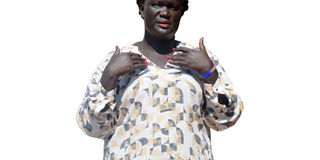Jacquelyne Alesi’s struggle with emotional violence

Alesi explains her ordeal. Photo by Esther Oluka.
What you need to know:
Jacquelyne Alesi got married at 23 years old. Her husband, who was 20 years old, used the fact that she was living with HIV/Aids to torment her every day of their married life until the couple decided to divorce. The years of emotional abuse took a toll on Alesi who has struggled to heal and put back pieces of her life together, writes Esther Oluka.
In 2010, at the age of 23, Jacquelyne Alesi got married. This was right after completing a Bachelors of Arts degree in Social Sciences from Kyambogo University. Her husband was 20 years old.
The couple first met in 2005 when they were both students at the Young Men’s Christian Association (YMCA) Comprehensive Institute.
At the time, Alesi was studying a diploma in counselling and guidance while he was a student of Information Technology (IT). What started off as a friendship later blossomed into a relationship, and, eventually marriage. At the time the couple settled down, Alesi was living with HIV/Aids which she says she contracted as a teenager while her husband was negative.
The emotional abuse
Only a few days into the marriage, Alesi’s husband began humiliating, intimidating and verbal attacking her. He used her HIV status to belittle and ridicule her.
“There are a number of bad things he did to me, some are very hurtful to mention. He wanted me to believe he did me a favour by marrying me,” she says.
There is nothing good that Alesi could do according to her husband who blamed and criticise everything she did, all the time.
“All I wanted was respect from him, but, he failed to accord it to me. I wanted his friendship, but, he did not give it to me,” she adds.
The stress from the marriage affected Alesi’s health to the extent that her CD4 count went down thus lowering the defensive mechanism of her body, making her more vulnerable to getting various infections.
When she sought advice and help from a few friends, some concluded that probably her problems manifested because of the undeniable fact that she was older than him.
“They said I was old, and, he was a child,” she says, adding, “But the age difference was not that big. I was only three years older than him,” she says.
In hindsight, Alesi, thinks they might have rushed into marriage. “We did not get enough counselling and we were not prepared enough. I thought (at the time) we were both ready for marriage but the truth was, we were not,” she says.
The separation
The couple ended up separating and divorcing in 2017.
“I had to get out and retain what was left of my sanity,” she says.
Alesi walked away from the marriage leaving most of the material possessions with her now ex-husband. “I only packed my clothes and those which belonged to my son. Then, we got into my car and left, never looking back,” she says.
Alesi says she preferred to leave most of the material possessions to her husband and start a new chapter.
“I had suffered enough and just wanted out. I did not want to start engaging in fights for properties because that would be another tedious painful battle,” she says, adding, “I did not mind starting life from scratch.”
Picking up the pieces
After the marriage ended, Alesi struggled to put her life back on track. She directed her energy into raising her son, now eight years old, and running Uganda Network of Young People Living with HIV/Aids (UNYPA), until recently. UNYPA, is designed to help and support young HIV-positive people. Now, she is the executive director of Friends of Canon Gideon Foundation (FOCAGIFO). Among its several objectives, FOCAGIFO focuses on spiritual empowerment, youth empowerment as well as sensitising members of the public on HIV/Aids.
In love again…
Although she had vowed not to get into another relationship, Alesi met someone who swept her off her feet.
“He is a special man, and a friend who has been very helpful in encouraging me to restore my life. We got engaged last year (2018), and this year, we are planning our big wedding,” she says.
Once again her partner is HIV-negative. She insists that this “special man” loves her for who she is. To other women going through emotional abuse, Alesi advises them to save themselves because no one else will.
how to tell you are being emotionally abused
David Kavuma, a counselling psychologist at Adonai Counselling and Training Services, highlights them as the following:
• The abusers use abusive or hurtful words to attack the other party. This includes constant criticism.
• Belittling and undermining one’s worth or potential by telling them that they are not good enough.
• Humiliating an individual in front of other people.
• Isolating one’s partner.
• Abusers do not care about how you are feel and are emotionally detached.
• Use of silent treatment whereby rather than addressing the issue, one party decides to keep quiet leaving the other individual feeling guilty and wondering if they have done anything wrong.
SOLUTION
“Victims can try to talk to their partners by opening up on their feelings about the situation at hand. If this fails, victims can then involve another trusted third party to help them sort out their issues. It could be a friend or family member. In case this fails they should try professional counselling,” Kavuma advises.”




